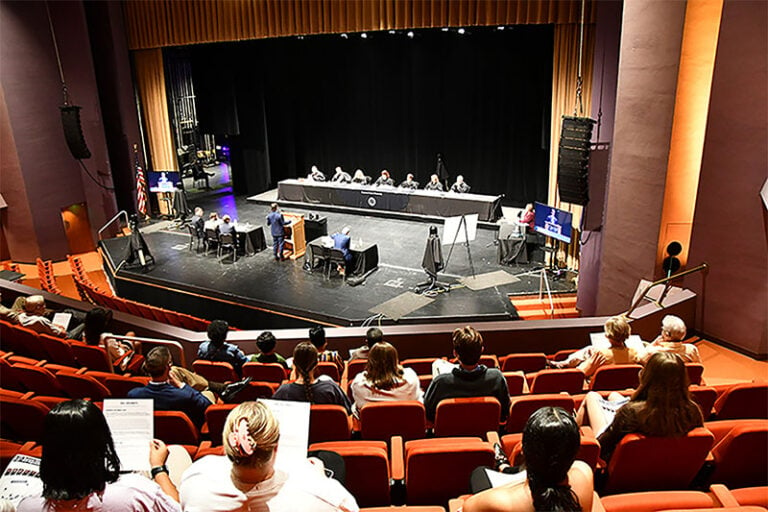“Educators are on Strike in the Commonwealth”
That’s quite the title. And you might look at it and say it’s untrue in Kentucky. Most recently teachers in Oakland and Portland struck, but that’s not the Commonwealth. But the fact is, TEACHERS ARE ON STRIKE here in Kentucky. And please make no mistake about it, teachers are on a WAGE STRIKE.
What’s different about this strike? This is a strike of both the veteran and early career teachers, but there is no picket line. As you may have seen in a December 29th WKMS article, nearly 25% of the educators in the Commonwealth left their position after the 22-23 school year. While that number includes classroom teachers who leave for administration positions, it also includes those who have left the profession altogether. What is clear, nevertheless, is that teachers are striking by leaving the classroom for better pay.

Educators in the Commonwealth have not had a raise since 2008. Kentucky ranks 44th in starting teacher pay and 40th in average salary. Both the Republican and Democratic candidates for governor had teacher compensation as part of their platform. In a December 21st interview with WCHS, Senate President Robert Stivers stated that an increase in pay is needed to stay competitive. However, with the beginning of the 2024 Legislative session, he has suggested that any teacher increases will be funded district by district through the current SEEK formula and will not be earmarked for employee pay specifically. In essence, any increase in pay will not be directed to every educator in Kentucky, but will be at the discretion of the local board, not mandated by the state.
Recently a former student commented that one of the major factors for leaving the profession after just three and a half years was that her teacher pay was not enough to cover her bills. I remember her as a student in my classroom excitedly speaking about her future career in education. While her passion for the profession and desire to become a teacher was enchanting, unfortunately, that passion and desire could not pay the bills. Now you might be thinking “Well, maybe her lifestyle was more than her budget.” You’ll have to take my word for it, her lifestyle isn’t.
She didn’t want to be part of any wage strike. But she had no choice in Kentucky’s current educational environment. I wish her story wasn’t so typical for thousands of other educators in the commonwealth who dreamed of becoming a teacher, but upon fulfilling that dream faced the grim reality of simple economics: surviving on a starting
teacher’s salary isn’t feasible.
To make matters worse, this wage strike is spreading. More and more educators are leaving the profession in mid-career, after approximately 12 to 20 years of service, to maximize their earnings while they can. And make no mistake, this isn’t a strike by teachers. This is a strike by all school staff members: bus drivers, para educators, custodians, food service workers, and administrators who rank 48th nationally in pay, according to the National Education Association.
How does this all-too-silent wage strike across the commonwealth get settled? It’s simple: raise educator pay. It doesn’t just help them. It helps our students, communities, parents, and taxpayers.
How does an increase in educator pay help students, parents and taxpayers, one might ask? Here’s how:
1. Every dollar spent to retain a teacher is a dollar saved. Local board’s do not have to spend as much on recruitment. They don’t have to spend as much on-boarding new employees (the HR stuff). They don’t have to spend as much on training teachers in the systems unique to each district.
2. Retaining veteran teachers helps the system grow. I had a great (unpaid) student teaching experience, but as well prepared as I thought I was, I wasn’t fully prepared for my first classroom. I am thankful every day for the veteran mentors who helped me in those first years to become the teacher I am today.
3. Retaining teachers benefits the student. When students have consistency in their buildings they flourish. Schools are communities and when students have consistency in their community they thrive.
What can you do to help end this strike? You can reach out to and work with your state legislators to advance what is important to you and your community. You can contact your local lawmakers and council members and ask them to work to mandate that the best school employees are retained and recruited for your students. When we can recruit and retain the very best, when we have a consistent faculty and staff from year to year and our students have greater success.
Help end the educators’ Wage Strike in the commonwealth. Use your voice and let it be known to those we vote to represent us. Tell them that raising pay for educators is what’s best for all of us who live and work in Kentucky and to vote accordingly to settle this strike that, in the end, continues to punish us all.
Kelly Read is president of the Boone County Education Association. He has been an educator for 26 years and teaches English at Boone County High School.

















